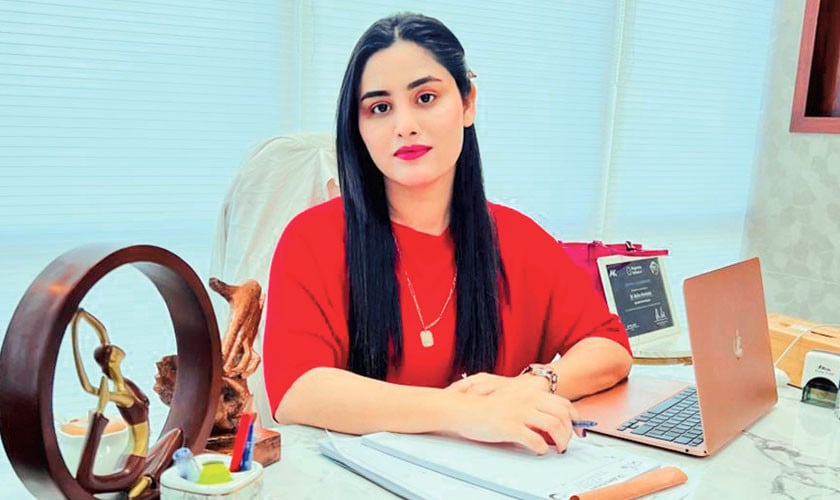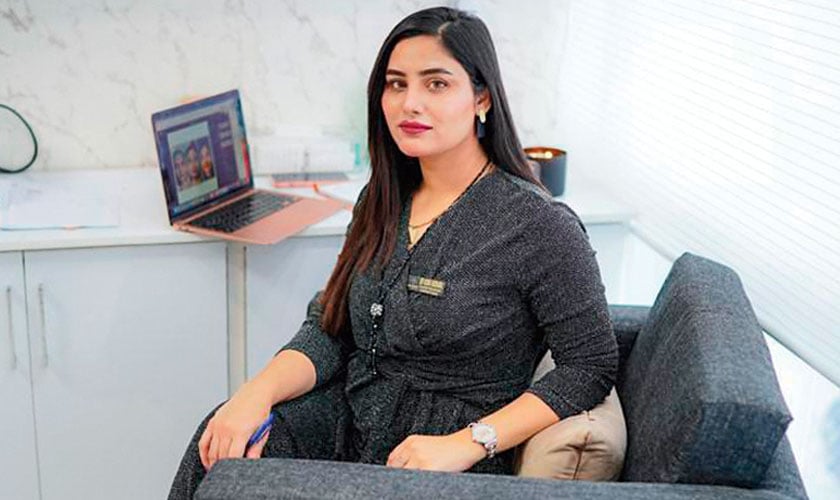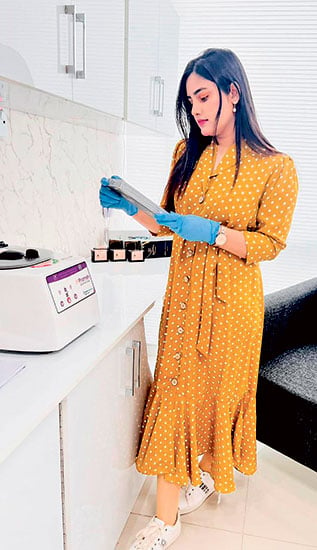skin
Dr Aisha Humaira is a Karachi-based dermatologist and aesthetic physician with over 10 years of experience in clinical dermatology and aesthetic medicine. She is the founder of ‘Skinversion’ where advanced skin, hair, and laser treatments are offered using the latest medical-grade technologies.
She holds certifications in both aesthetic gynaecology and regenerative medicine, which allows her to provide holistic, cutting-edge treatments – from cellular rejuvenation and exosome therapy to intimate wellness and anti-aging solutions.
She sees skin care and aesthetics not just as a profession but as a way to restore self-confidence. She believes in treating the root cause, not just the surface, and combining science with empathy to bring out the best version of every individual who walks into my clinic. In an exclusive interview, Dr Aisha shares her views on skincare with our readers…
What was your inspiration behind becoming a dermatologist and an aesthetic physician?
After completing my MBBS, I chose dermatology because it allowed me to address both medical and cosmetic skin concerns. My interest in aesthetic medicine evolved from seeing how much a person’s skin affects their confidence and emotional well-being. Combining medical dermatology with aesthetic treatments allows me to offer safe, evidence-based, and result-oriented care that not only heals the skin but also enhances natural beauty.
What’s the difference between an aesthetician and an aesthetic physician?
An aesthetic physician is a doctor with advanced training in non-surgical cosmetic procedures such as lasers, injectable, regenerative therapies, and skin rejuvenation. On the other hand, an aesthetician is a non-medical professional who performs basic skincare treatments like facials and superficial peels.
If you had to pick essential products for a short skincare routine, what would they be?
A cleanser, Vitamin C serum less than 10 per cent or Niacinamide, sunblock, and a moisturiser at night – that’s your basic but powerful routine.
How important are moisturisers?
Moisturisers are essential. They protect your skin barrier, prevent dehydration, and enhance the results of active ingredients.
Do you recommend sunscreen for daily use – if so, why?
Daily use of sunscreen is essential – not just for preventing tanning, but for protecting the skin from premature aging, pigmentation, and long-term sun damage. I always recommend a broad-spectrum sunscreen that covers both UVA and UVB rays. Personally, I prefer using sunblock’s with SPF 60 or higher, especially those containing titanium dioxide and zinc oxide, as they physically block up to 99 per cent of harmful UV rays and are safer for sensitive or acne-prone skin. For me, sunblock isn’t optional – it’s the most powerful anti-aging and skin-protecting step in your routine.
How one can keep one’s skin fresh during summer?
For summer, add a gel-based moisturiser and antioxidant protection to combat sun damage.
What are some common mistakes people make with their skin?
Over-exfoliating, skipping sunscreen, trying too many new products at once, and following trends blindly from social media. Also, not consulting professionals for recurring skin concerns.
What is the biggest skin care myth you want to debunk?
That ‘natural’ always means safer. Not every natural ingredient suits your skin, and many lack scientific backing. Professional-grade, well-formulated products are safer and more effective.
What’s the most revolutionary beauty product launch ever?
I’d say topical retinoid and broad-spectrum sunscreens. But recently, exosome-based therapies are truly changing the game in skin regeneration.
How important are facials in maintaining skin firmness?
Facials play a supportive role in maintaining skin health and firmness. They help improve blood circulation, exfoliate dead skin cells, boost hydration, and enhance product absorption – all of which contribute to a fresher, firmer-looking complexion over time.
One facial I particularly recommend is the Salmon DNA Facial, which has gained popularity for its regenerative and anti-aging properties. It contains polynucleotides derived from salmon DNA, which help stimulate collagen production, repair damaged skin, improve elasticity, and give the skin a visibly smoother and firmer texture.
Should micro current facials only be done by trained professionals?
Yes – because they use low-level electrical currents to stimulate muscles and skin. It requires proper technique and understanding of facial anatomy to ensure safety and effectiveness.
How safe are micro current facials, are there any side effects?
When performed by trained professionals, they’re very safe and non-invasive. Side effects are minimal – slight redness or tingling – but no downtime.
What’s your favourite skin procedure?
It’s hard to choose just one, but I love combining Sylfirm X or Virtu RF (for pigmentation and skin tightening) with MCT therapy. The results are clinically powerful yet natural-looking.
What services do you offer at Skinversion?
We offer a wide range of treatments including anti-aging treatments, and non-surgical skin tightening. We are also providing non-surgical body contouring treatments including Neo Sculpt, cavitation’s, fat freezing and customised I/V for slimming and hormonal issues.
You’ve launched your own skin care line. What are your most popular products?
Our skin care line includes targeted, dermatologist-formulated products. Our Vitamin C serum with has unique combo with turmeric which is anti-inflammatory as well, and pigmentation controlled. Our ‘Glow Recipe’ serum and ‘Unseen SPF100’ are best sellers. They’re designed for real skin concerns with real results. Our hair serum ‘Hair Night Repair’ is the most popular in hair care regimen.
What advice would you give to people about skin care?
Don’t overcomplicate your routine. Use clinically proven ingredients. Consistency is key. And always consult a professional before trying treatments based on trends.
What will the aesthetic industry look like in 10 years?
The future of aesthetic medicine is all about personalisation and precision. Over the next decade, we’ll see a major shift from one-size-fits-all treatments to individualised protocols based on your skin type, hair texture, genetic profile, and lifestyle.
We have already started integrating this approach with tools like Alma IQ – an AI-powered skin analysis system that reads your skin’s exact needs, from hydration levels to pigmentation patterns. This kind of data-driven technology ensures that treatments are no longer based on assumptions, but on clear clinical insights. Because no two skins or scalps are the same, aesthetic medicine should never be generic. In the next 10 years, I believe we’ll see more clinics moving toward tailored, science-based solutions that focus on long-term skin health, prevention, and natural rejuvenation.



